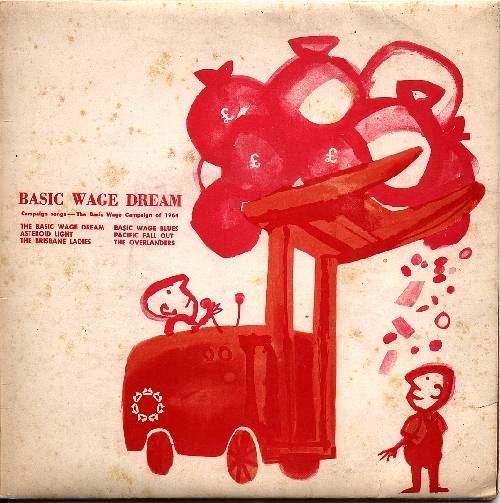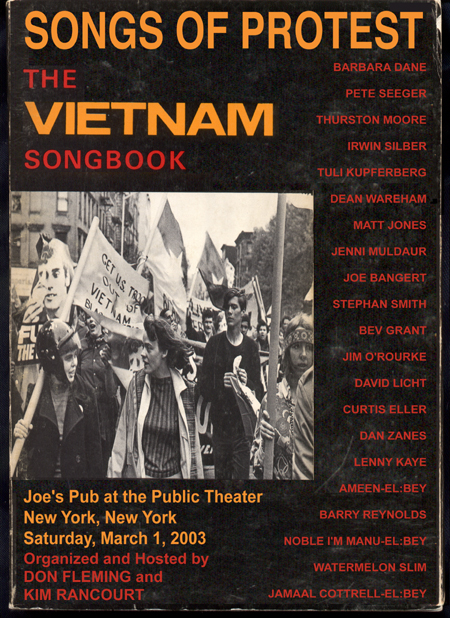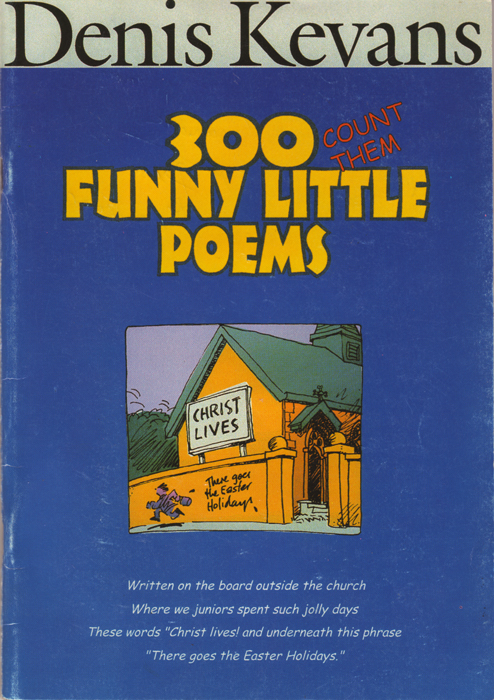Unions and the Australian Folk Revival
an article by Mark Gregory (this article first appeared in Arts Hub Australia 24 Jan 2007)
Wherefore this hate and satire, and this bitter
irony
That is running through these verses? Is it this you ask of me;
Go search along the highways, the hungry tucker tracks,
In the huts of the cane-cutters, and the dirty cocky's shacks.
The
shearing sheds and mining camps and god-forgotten spots,
Where for the sake of profit man toils and sweats and rots;
Go, search the filthy alleys where the night pariahs hunt,
Go and learn the vile conditions of your city's waterfront.
Go, and
better still, go hungry through the city's profit mills,
Go tramping, broke and thirsting, o'er the burning plains and hills;
Go and learn of the discomfort of a bed of grass or sand.
Go shivering in the winter, and perhaps you'll understand.
Go and
try to ease your hunger on Salvation Army stew,
And the question you are asking will then be answered by you;
All the bitterness and hatred out of vile conditions spring,
Well, I know those vile conditions – of the things I know I sing.
When the forgotten poet and wharfie Ernest Antony wrote Of the Things I Know I Sing, some time around 1930, he was following a long tradition of poets and songwriters inspired by the belief that organised workers would build an independent Australia based on freedom, justice and equality. We know that Antony's poems were published in the vibrant workers' publications of the between wars years but only one of his poems, The Hungry Mile, is well known today.
Forgotten poet, hidden poetry: it's time to re-evaluate this union oriented cultural activity.
The Australian labour
movement has encouraged and sponsored a variety of cultural production.
From its birth in 1932, New Theatre, once a nation-wide theatre movement
and today Australia's longest running theatre, always had union
support.
The first New Theatre play I saw in the early 1960s was at the Waterside Workers' headquarters in Sydney. In the same headquarters were the offices of the legendary Waterside Workers' Film Unit during the 1950s, a documentary unit that is sometimes credited with being the precursor of today's Australia film industry. Union journals, leaflets, pamphlets were also important for many Australian poets, writers, journalists, artists, cartoonists and designers. Union banners and murals at times employed artists like Noel Counihan, Herb McClintock and Rod Shaw. Today Birgitte Hansen is working on an eight hour day mural inside Sydney's Trades Hall.
 My research has focused on the links between unions and the Australian
folk revival in the post
My research has focused on the links between unions and the Australian
folk revival in the post
World War 2 period. Some of the songbooks I collected had union sponsorship
like Therese Radic's Songs of Australian Working Life, Chris Kempsters' Songs
of Henry Lawson and of course the Builders' Labourers' Song
Book. I also had the experience of farming out pages of Songs of Our
Times, published by the Sydney University Folk Music Society in 1964,
to a number of unions in Sydney for help in getting the songs typed onto
waxed stencils for duplication.
Unions also sponsored recordings; campaign records like Oh Pay Me and Basic Wage Dream in the early 1960s or Don Henderson's LP One Out (1966) and Declan Affley's Rake and Rambling Man (1968).
Australian Tradition, the folk magazine edited for ten years by Wendy Lowenstein, became the main vehicle for new union songs mostly written by members of the folk revival. This was the time of mass peace protests which had strong union support, the beginnings of Women's Liberation which was launched alongside the union campaign for equal pay.
It was also the time of a new Aboriginal push for equality
and land rights. The Wattie Creek sit
down strike in the Northern Territory had the backing of progressive
unions throughout Australia (it became the subject of two well known
songs Ted Egan's Poor Bugger
Me and the Kev Carmody/Paul Kelly song From Little Things Big Things
Grow. Like "the
times" Australia was certainly achangin'.
 The huge Vietnam War protests had very strong
backing from unions and eight Australian songs were included in The Vietnam
Songbook, published in 1969 by Barbara Dane and Irwin Silber in the US,
a comprehensive collection of 144 songs from the anti-war movement around
the world. One of those songs was Don Henderson's Boonaroo
celebrating the refusal of members of the Seamen's Union of Australia
to man a civilian ship carrying munitions to Vietnam.
The huge Vietnam War protests had very strong
backing from unions and eight Australian songs were included in The Vietnam
Songbook, published in 1969 by Barbara Dane and Irwin Silber in the US,
a comprehensive collection of 144 songs from the anti-war movement around
the world. One of those songs was Don Henderson's Boonaroo
celebrating the refusal of members of the Seamen's Union of Australia
to man a civilian ship carrying munitions to Vietnam.
The relationship between songwriters of the folk revival and unions is a long and complicated one. The continuing relationship can be seen by the fact that on the Union Songs website there are contemporary songs and poems from over 100 Australian authors. These are union songs in the broad sense of being about the range of concerns of organised workers and their unions, like the ones I've mentioned above. Some people are surprised that many folk festivals have concerts and workshops that celebrate union songs. I think that since the folk revival in Australia began with strong links to militant unions that has become a tradition in itself, almost unnoticed by either the unions or the revival activists.
Each decade since has
seen the relationship between the labour movement and the folk revival
evolve. In 1979 there was the LP Flames of Discontent funded by the Queensland
Branch of the Seamen's Union. In the 1980s there was the Art in
Working Life Program adopted by the ACTU and run by the Australia Council
in its pre-Howard
years.
 A
number of song projects came out of that funding, the most important
probably being the collection of Australian railway songs and poems researched
by Brian
Dunnett and Denis Kevans and resulting in the cassette Trains of Treasure.
1996 saw the CD Union is Strength produced by Geoff Francis and Peter
Hicks and funded by the mining section of the Construction Forestry Mining
and Energy Union (CFMEU). The same year Western Australian unions funded
a CD of Bernard Carney songs, Stand Together. In 2000 the Labor Council
of NSW funded a CD MayDay MayDay based on the results of its May Day
Song competition.
Recently re-badged Union NSW the organisation often publishes biting
songs and poems on its Workers Online website. In 2003 the Maritime Union
of Australia (MUA) funded the production of its centenary CD With These
Arms a collection of songs and poems related to the union's history.
A
number of song projects came out of that funding, the most important
probably being the collection of Australian railway songs and poems researched
by Brian
Dunnett and Denis Kevans and resulting in the cassette Trains of Treasure.
1996 saw the CD Union is Strength produced by Geoff Francis and Peter
Hicks and funded by the mining section of the Construction Forestry Mining
and Energy Union (CFMEU). The same year Western Australian unions funded
a CD of Bernard Carney songs, Stand Together. In 2000 the Labor Council
of NSW funded a CD MayDay MayDay based on the results of its May Day
Song competition.
Recently re-badged Union NSW the organisation often publishes biting
songs and poems on its Workers Online website. In 2003 the Maritime Union
of Australia (MUA) funded the production of its centenary CD With These
Arms a collection of songs and poems related to the union's history.
One of the highlights of the National Folk Festival in Canberra each
year is the Union Concert. It is an established concert as old as the
National being permanently held in Canberra. At its inception it was
funded from a small donation from the local CFMEU branch. Performers
from around the world are eager to take part in the concert which always
has a large audience. In the National Folk Festival Program in 2005 Jan
Nary interviewed CFMEU Assistant Secretary Glenn Parry who said
"Folk music was one of the first tools in the working class struggle and
that hasn't changed... We're rapt about being involved with this Festival,
it draws talent from all around the world and it's a real reflection of who we
are now in Australia."
Today the CFMEU is one of the major sponsors of the National
Folk Festival. In an interview in
2003 Seamus Gill, long time organiser of the Union Concert, explained
to me that the concert can be quite controversial.
"Not everybody is happy with there being a union concert and it was quite
interesting in the year when the MUA dispute was going on in 1998,
that was in the Budawang, the largest venue in the festival that holds comfortably
2000, that was actually packed, despite the fact that outside there were some
members of the National Farmers Federation trying to hand out leaflets telling
people not to go in as it was a union concert," he said.
"That was the year, I'm not sure it was the best quality but it definitely
had the largest audience and the most participation and it was actually
really stirring".